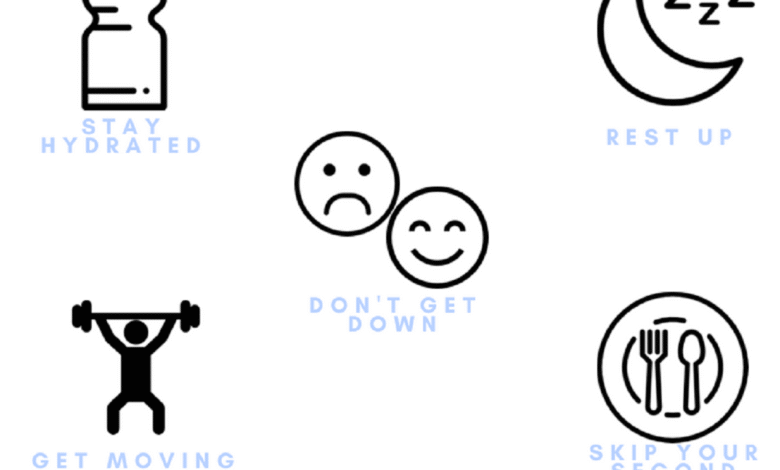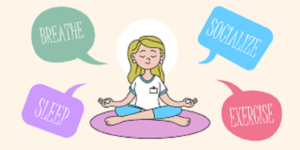Five Tips for a Healthy Lifestyle in 2023.

Living a healthy lifestyle is essential for maintaining physical, mental, and emotional well-being. With the increasing prevalence of chronic diseases and mental health issues, it has become more important than ever to prioritize our health. In this article, we will share five practical tips for a healthy lifestyle in 2023 that can help you achieve optimal health and happiness. From making small changes to your daily routine to adopting healthy habits, YezzBuzz tips will guide you toward a healthier and happier life.
Five Tips for a Healthy Lifestyle in 2023:
Eat a Balanced and Nutritious Diet for a Healthy Life
Eating a balanced and nutritious diet is important for maintaining good health and preventing chronic diseases. A balanced diet should include a variety of foods from all food groups, such as fruits, vegetables, whole grains, lean proteins, and healthy fats.
Fruits and vegetables are great sources of vitamins, minerals, and fiber. Aim for a variety of colorful fruits and vegetables to get a range of nutrients. Whole grains provide complex carbohydrates, fiber, and important vitamins and minerals. Examples of whole grains include brown rice, quinoa, whole wheat bread, and oatmeal.
Lean proteins like chicken, fish, beans, and lentils are important for building and repairing muscles and tissues. Healthy fats, such as those found in nuts, seeds, avocados, and olive oil, can help improve cholesterol levels and reduce the risk of heart disease. It is also important to limit processed foods, sugary drinks, and foods high in saturated and trans fats, as they can increase the risk of chronic diseases such as obesity, diabetes, and heart disease.
In summary, a balanced and nutritious diet should consist of a variety of foods from all food groups, with a focus on whole, unprocessed foods.
Read More: 5 Ways to Keep Your Lifestyle Easier: Simplify Your Life Today!
Exercise Regularly
Regular exercise is important for maintaining good physical and mental health. It can help improve cardiovascular health, strengthen muscles and bones, and reduce the risk of chronic diseases such as diabetes and certain types of cancer. Exercise can also help reduce stress and improve mood
It is recommended that adults engage in at least 150 minutes of moderate-intensity aerobic exercise per week, or 75 minutes of vigorous-intensity aerobic exercise per week. Additionally, muscle-strengthening activities should be performed at least two days per week.
Moderate-intensity activities include brisk walking, biking, and swimming, while vigorous-intensity activities include running, fast-paced cycling, and high-intensity interval training (HIIT). Muscle-strengthening activities can include weightlifting, resistance band exercises, and bodyweight exercises such as push-ups and squats.
It is important to start slowly and gradually increase the intensity and duration of exercise to avoid injury. Additionally, it is important to consult with a healthcare provider before starting a new exercise routine, especially if you have any underlying health conditions.
In summary, regular exercise is important for overall health and well-being. Adults should aim for at least 150 minutes of moderate-intensity aerobic exercise per week, in addition to muscle-strengthening activities at least two days per week.
Get Enough Sleep
“Get enough sleep” is an important piece of advice that you often hear when it comes to maintaining good health and well-being. Adequate sleep is essential for our physical and mental health, and it can have a significant impact on our daily lives.
Getting enough sleep means getting the recommended amount of sleep each night, which varies depending on age and individual needs. Generally, adults need 7-9 hours of sleep per night, while children and teenagers need more.
Sleep is critical for many bodily functions, including memory consolidation, hormone regulation, and tissue repair. Lack of sleep can lead to a range of health issues, such as fatigue, mood swings, difficulty concentrating, and even an increased risk of chronic diseases such as obesity, diabetes, and heart disease.
To get enough sleep it’s important to establish a regular sleep schedule and stick to it, even on weekends. You can also create a relaxing bedtime routine, avoid stimulants such as caffeine and nicotine before bedtime, and create a sleep-friendly environment by keeping the room dark, cool, and quiet. By prioritizing sleep and making it a part of your healthy lifestyle, you can reap the many benefits of a good night’s rest and improve your overall well-being.
Managing Stress

Managing stress is essential for maintaining good mental and physical health. Stress is a natural response to challenging situations, but prolonged or chronic stress can have negative effects on the body and mind. Here are some tips for managing stress:
- Identify the Source of Your Stress: The first step in managing stress is to understand what’s causing it. Keep a stress journal to identify patterns and triggers.
- Practice Relaxation Techniques: Deep breathing, meditation, and yoga can help you relax and reduce stress.
- Exercise Regularly: Physical activity can help reduce stress and improve overall health. Aim for at least 30 minutes of moderate exercise most days of the week.
- Get Enough Sleep: Lack of sleep can increase stress levels, so it’s important to get enough restful sleep each night.
- Eat a Healthy Diet: Eating a balanced diet that includes plenty of fruits, vegetables, whole grains, and lean protein can help manage stress.
- Connect with others: Spending time with friends and family or participating in social activities can help reduce stress and improve your mood.
- Set Realistic Goals: Setting achievable goals and prioritizing tasks can help reduce stress and increase feelings of control and accomplishment.
By taking steps to manage stress, you can improve your overall health and well-being. Remember, it’s okay to ask for help if you need it, whether it’s from friends, family, or a mental health professional.
Staying connected with others is an important part of maintaining good mental health and well-being. Human beings are social creatures, and we thrive on social interactions and relationships. Here are some tips for staying connected:
By staying connected with others, you can improve your mental health and well-being and develop a support network that can help you through challenging times. Remember, it’s important to prioritize social connections and make time for social activities in your life.
FAQs:
Q. What are the benefits of living a healthy lifestyle?
A. Living a healthy lifestyle can help you maintain a healthy weight, reduce the risk of chronic diseases, improve your mental health, and boost your energy levels.
Q. How can I start living a healthy lifestyle?
A. You can start living a healthy lifestyle by making small changes to your daily routine, such as eating a balanced diet, exercising regularly, getting enough sleep, managing stress, and staying connected with others.
Conclusion
In conclusion, living a healthy lifestyle is essential for maintaining good physical and mental health. By prioritizing healthy habits such as regular exercise, a balanced diet, adequate sleep, stress management, and social connections, we can improve our overall well-being and reduce the risk of chronic diseases. Making healthy choices can be challenging in 2023, but it’s important to remember that small changes can make a big difference. By setting realistic goals, creating healthy habits, and making healthy choices a part of our daily routine, we can achieve a healthier and happier life.











5 Comments